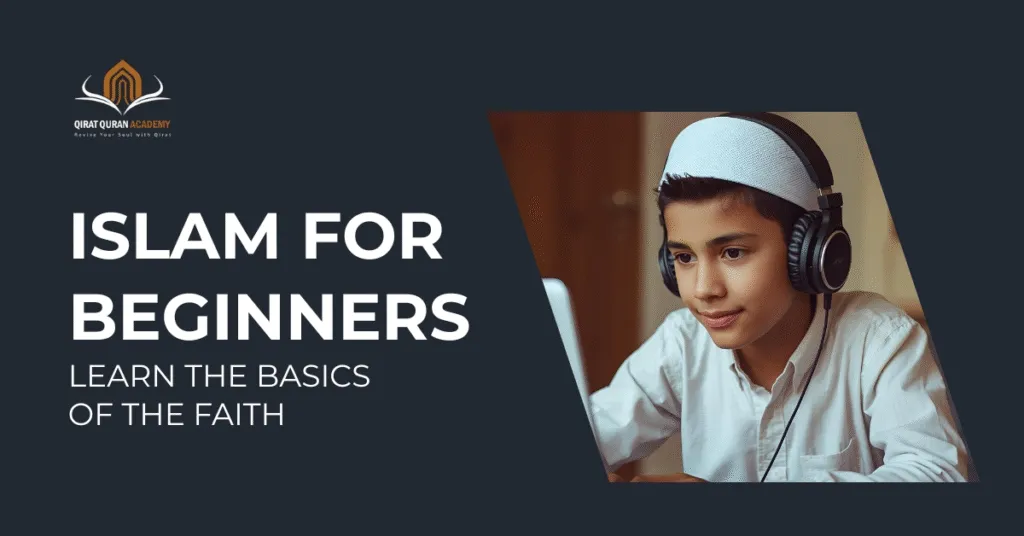Islam is a monotheistic belief that lies in the belief that there is a God (Allah) and Prophet Muhammad (peace on him) is his last messenger. In its heart, Islam asks people to live with intention – to worship God, do good for others, and to arrange life around moral and spiritual purpose. Think Islam as a compass: This indicates spiritual relations, moral behavior and community responsibility. If you are looking for “Islam for beginners“, then after a map, you do not have a list of rules. This article gives you a map – clear, friendly and practical.
Why Learn Islam? Benefits for Beginners
Why study Islam? Good question. Whether your interest is spiritual, academic, cultural, or personal, learning Islam can:
- Give you a clear framework for ethical decision-making.
- Introduce spiritual practices that calm the heart (like prayer and remembrance).
- Connect you to a rich history, literature, art, and a global community.
- Offer tools to improve daily life: discipline, charity, and gratitude.
Learning for the right reasons — curiosity, respect, and a desire to understand — makes the process meaningful and joyful.
The Five Pillars of Islam — Core Practices
The five columns are the practical spine of a Muslim life. They are simple to name but are rich in living.
Shahada — The Declaration of Faith
Shahd says: “There is no God, but Allah, and Muhammad is the messenger of Allah.” This is not just a sentence – it is a switch that turns on a new identity. For a beginning, what it means to be a Muslim is its essence.
Salah — Prayer: Rhythm of the Day
Advice (five daily prayer) structures during the day. Imagine hitting a reset button five times each day-a moment to re-add, reflect and reel again. You do not require perfection to start; Start the basics and build a rhythm.
Zakat — Charity and Social Justice
Zakat is a compulsory donation for those who achieve qualifications – a system that reinforces money and supports community welfare. Even without formal zakat, regularly cultivates sympathy and breaks the habit of selfishness.
Sawm — Fasting in Ramadan
Fasting during Ramadan is a complete-body practice in self-discipline and spiritual meditation. It prefers to clean a disorganized room: once the distractions are removed, you should note what matters.
Hajj — Pilgrimage to Mecca
Hajj is once a lifetime pilgrimage for those who can tolerate it. It symbolizes unity – millions of clothes are similar, similar in front of God. As a beginner, understand Haj as a communal crown of worship.
The Six Articles of Faith — What Muslims Believe

These are the core beliefs that shape a Muslim’s worldview:
Belief in Allah
Monotheism: God is One, unique, and beyond all comparison.
Belief in Angels
Spiritual beings who carry out God’s commands and record human deeds.
Belief in the Divine Books
Including the Quran (final revelation) and earlier scriptures in principle.
Belief in the Prophets
A line of messengers — from Adam to Muhammad (peace be upon them all).
Belief in the Day of Judgment
Life has moral consequences; justice will be fulfilled beyond this world.
Belief in Divine Decree (Qadar)
Everything happens with God’s knowledge — this combines hope and responsibility.
These beliefs give context to practice; they’re the “why” behind the “what.”
The Quran and Hadith: Your Primary Guides
The Quran is the central text of Islam — believed to be the literal word of God in Arabic. Hadith are sayings and actions of Prophet Muhammad (peace be upon him) that explain and exemplify Quranic guidance.
How to Start Reading the Quran as a Beginner
- Begin with a good translation in your language.
- Read short surahs (chapters) like Al-Fatiha, Al-Ikhlas, Al-Falaq, An-Nas.
- Use trusted commentaries (tafseer) for context — they explain historical background and deeper meanings.
Practical Tips: Transliteration, Translation, & Tajweed
If Arabic is new to you, transliteration helps with pronunciation, translation helps with meaning, and tajweed helps with correct recitation. You don’t need perfect tajweed to start; you need curiosity and consistency.
Everyday Practices: Wudu, Prayer, and Clean Living
Learn the basics of Wudu, daily prayer, and clean living in Islam to build a pure heart, healthy habits, and a spiritually balanced life.
Wudu (Ablution) — Why Cleanliness Matters
Wudu is a small ritual washing before prayer. It’s practical and symbolic: washing off distraction to approach prayer with clarity. Try it once — it feels like shaking sand off your feet after a long walk.
Simple Prayer Tips for New Muslims or Seekers
- Learn short phrases and the structure of prayer.
- Start with one prayer (like the midday) and expand gradually.
- Use guided videos or a patient teacher. Practice over perfection.
Common Misconceptions and Simple Clarifications
Clear up common misconceptions about Islam with simple, accurate explanations that highlight the faith’s true values of peace, justice, and compassion.
Is Islam Violent? — Short Answer
No. Like any major religion, Islam has many interpretations, but the faith’s core teachings emphasize peace, justice, and mercy. Violence is not a religious default; it’s a social and political problem with complex causes.
Role of Women — Rights and Spiritual Status
Islamic sources affirm spiritual equality between men and women. Cultural practices vary widely around the world; what belongs to faith and what belongs to culture are not always the same thing.
Practical Roadmap: How to Start Learning (Week-by-Week)
Here’s a gentle 6-week starter plan for someone searching “islam for beginners”:
- Week 1: Read a simple introduction to Islam and the Five Pillars; memorize the Shahada.
- Week 2: Learn Wudu and try one daily prayer (Salah).
- Week 3: Start reading short surahs and a trusted translation of the Quran.
- Week 4: Learn about the Prophet’s life (Seerah) — short, inspiring stories.
- Week 5: Connect with a teacher or online course (visit qiratquran for beginner-friendly Quran lessons).
- Week 6: Start a small habit: daily dua (supplication) and a weekly act of charity.
Apps, Short Surahs, and Daily Habits
Use apps and websites for guided recitation, short reminders, and community classes. Small daily habits beat one-time intensity every time.
Spiritual Values in Islam: Compassion, Forgiveness, Justice
At its best, Islam encourages inner transformation: humility, patience, forgiveness, and service. Think of spiritual growth like gardening — you water a little each day: prayer, reflection, charity, and upright conduct. Over time, patience and consistency yield deep roots.
Frequently Asked Questions (FAQs)
Start with reliable translation of Quran and Small Surah. Use translation to learn the accent and slowly add Tajweed (Rules of Lesson). For guided lessons, join early classes or use Qiratquran.
No – Learning is open to all. Many people study without changing Islam academically or spiritually. If you choose to embrace Islam, there is a simple declaration to become a martyr Muslim.
Basics can be understood in a few weeks with regular studies – it takes more time to understand. The objective is stable progress: small daily practice matters more than speed.
Yes. The major branches are Sunni and Shia, each of which has different schools of consideration within each. For beginners, focus on the main beliefs and practices that unite Muslims, then detect the difference with curiosity.
Look for teachers with good reviews, clear functioning and respectable learning environment. Online platforms such as Qiratquran provide structured lessons for beginners; Local mosques and community centers also have early classes usually.
Conclusion
Learning Islam is not a race – this is a trip. Start small, ask questions, and find community. Whether you are searching for spirituality or considering a new path, “Islam for beginners” is about clarity, compassion and practice. Take a breath, try a prayer, or read a small surah – these small tasks become stones that step into deep understanding.
If you want structured, initial-ordered Quran text and patient teachers, go to qiratquran-all background students were designed to help students read, understand and live life.




